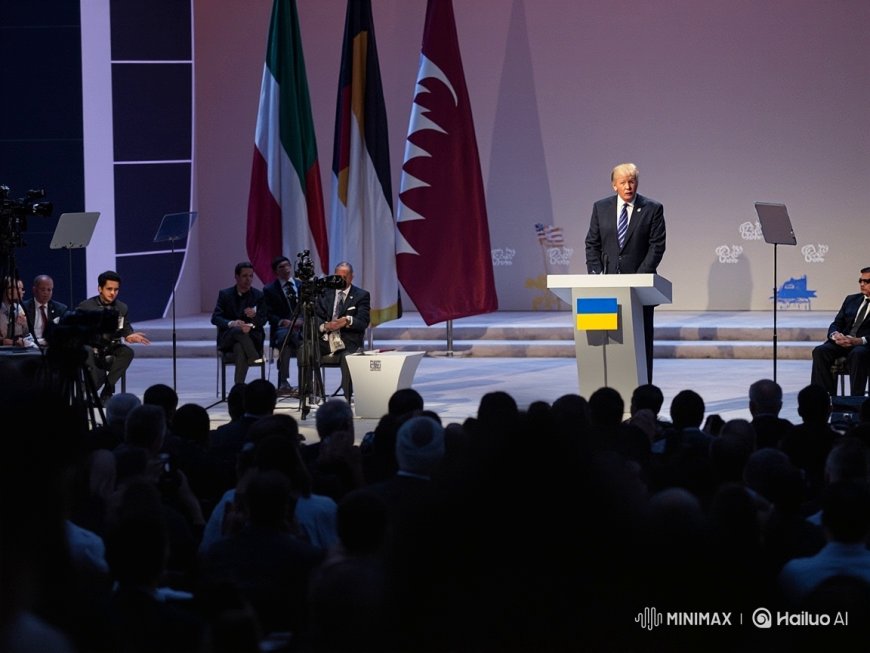Trump Slams Zelensky as ‘Salesman’ in Qatar, Backs Putin’s Turkey No-Show
Former President Donald Trump criticizes Ukrainian President Zelensky, calling him a ‘salesman,’ while supporting Putin’s absence from the Turkey summit. An in-depth look at the political impact and international implications.

At a recent event held in Qatar, former U.S. President Donald Trump delivered pointed remarks targeting Ukrainian President Volodymyr Zelensky, labeling him a “great salesman” in a sarcastic tone, while expressing support for Russian President Vladimir Putin’s decision to skip a much-anticipated summit in Turkey. Trump’s comments have stirred debate, highlighting the complicated stance within U.S. politics regarding the ongoing Russia-Ukraine conflict.
Trump’s Perspective on the Russia-Ukraine Conflict
During his speech, Trump emphasized the staggering human cost of the war, citing that “5,000 soldiers are killed every single week,” a grim figure that underscores his call for a swift resolution. Despite criticizing the massive financial aid sent to Ukraine — which he claimed totaled $350 billion with little accountability — Trump showed a genuine desire to see the bloodshed and economic drain come to an end.
His characterization of Zelensky as an exceptional fundraiser drew considerable attention. Trump sarcastically praised Zelensky’s ability to secure vast sums of aid, saying he could “walk away with a hundred billion dollars” every time he visited the United States. This depiction contrasts sharply with the usual unquestioning support offered to Ukraine by Western leaders and raises questions about the effectiveness and oversight of foreign assistance.
Backing Putin’s Absence from the Turkey Summit
Trump also addressed Vladimir Putin’s decision to not attend the upcoming Turkey summit, stating it was “predictable” given that Trump himself was not planning to go. He implied that Putin’s presence was contingent on Trump’s participation, suggesting that key political leaders’ involvement influences the willingness of others to engage.
This tacit support for Putin has sparked controversy, especially since the current U.S. administration has taken a firm stance in support of Ukraine. Trump’s remarks expose the fractures in American political discourse over how best to approach the conflict and diplomacy with Russia.
The MAGA Narrative and Domestic Political Implications
Throughout his speech, Trump reiterated his “Make America Great Again” (MAGA) slogan, dismissing President Joe Biden’s warnings about the movement’s political influence. Trump insisted that prioritizing America is both reasonable and beneficial, and asserted that despite this focus, the U.S. would still be able to “help the world.”
This rhetoric appeals directly to his core supporters, framing a nationalist agenda that criticizes current leadership while emphasizing American strength and autonomy on the global stage.
Economic Critiques and Proposals
Beyond the conflict, Trump commented on economic matters, highlighting recent trade improvements with China after implementing strict tariffs. He pointed out that six months ago, the U.S. was losing billions daily in trade but now is turning a profit.
He also floated the idea of creating a sovereign wealth fund aimed at paying down the national debt, reflecting his conservative fiscal priorities and commitment to restoring America’s financial health.
International Reactions and Potential Consequences
Trump’s statements have not only reverberated within the U.S. political sphere but have also drawn international scrutiny. His support of Putin and criticism of Zelensky may deepen divisions between Western allies and Russia, complicating efforts for diplomatic solutions.
Putin’s no-show at the Turkey summit, a meeting intended to foster dialogue, underscores the challenges of negotiating peace amid competing agendas and mistrust.
A Complex and Polarized Political Landscape
Donald Trump’s recent remarks in Qatar underscore the intricacies and deep divisions surrounding U.S. policy on the Russia-Ukraine conflict. By calling Zelensky a “salesman” and backing Putin’s absence at the Turkey summit, Trump challenges the current administration’s approach and stokes debate over America’s role in global affairs.
As the U.S. grapples with its responsibilities and strategies in the ongoing war, these comments add fuel to a contentious dialogue, reminding us that international politics remain a battleground of shifting alliances, economic interests, and power plays.
What's Your Reaction?
 Like
0
Like
0
 Dislike
0
Dislike
0
 Love
0
Love
0
 Funny
0
Funny
0
 Angry
0
Angry
0
 Sad
0
Sad
0
 Wow
0
Wow
0

































